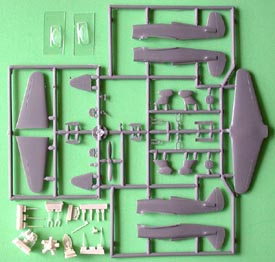Pavla’s 1/72 Yakovlev UT-1
By Chris Banyai-Riepl
 |

 |
 There is only one other 1/72 UT-1 kit that I’m aware of, and that’s the nice but hard to find NeoMega resin kit. This kit is likely to have a much better distribution and its plastic construction is likely to go together easier as well. The first thing that I’m struck with upon opening the box is that this is a very small airplane! You get one tree of dark gray plastic parts, a couple of vacuformed canopies, and a handful of resin detail parts. There’s not much to this model so construction should go pretty quickly.
There is only one other 1/72 UT-1 kit that I’m aware of, and that’s the nice but hard to find NeoMega resin kit. This kit is likely to have a much better distribution and its plastic construction is likely to go together easier as well. The first thing that I’m struck with upon opening the box is that this is a very small airplane! You get one tree of dark gray plastic parts, a couple of vacuformed canopies, and a handful of resin detail parts. There’s not much to this model so construction should go pretty quickly. The decal sheet is rather small, but so is the plane! You get no less than four options, two of which are camouflaged and two that are a bit more garish. The camouflaged ones are painted in green and black over blue, with white numbers on the rudders. One is with unspatted wheels while the other is with skis. Both of these are UT-1bs and can therefore be outfitted with that neat weaponry. The sole UT-1.02 prototype is the one that was present at the Yakovlev OKB museum and is painted light green over blue, with a red and white striped rudder. This is the only one with the large tail. The final example is finished in white with red trim and is easily the most attractive of all four schemes. The decals are well printed and should go down without any troubles at all.
The decal sheet is rather small, but so is the plane! You get no less than four options, two of which are camouflaged and two that are a bit more garish. The camouflaged ones are painted in green and black over blue, with white numbers on the rudders. One is with unspatted wheels while the other is with skis. Both of these are UT-1bs and can therefore be outfitted with that neat weaponry. The sole UT-1.02 prototype is the one that was present at the Yakovlev OKB museum and is painted light green over blue, with a red and white striped rudder. This is the only one with the large tail. The final example is finished in white with red trim and is easily the most attractive of all four schemes. The decals are well printed and should go down without any troubles at all.